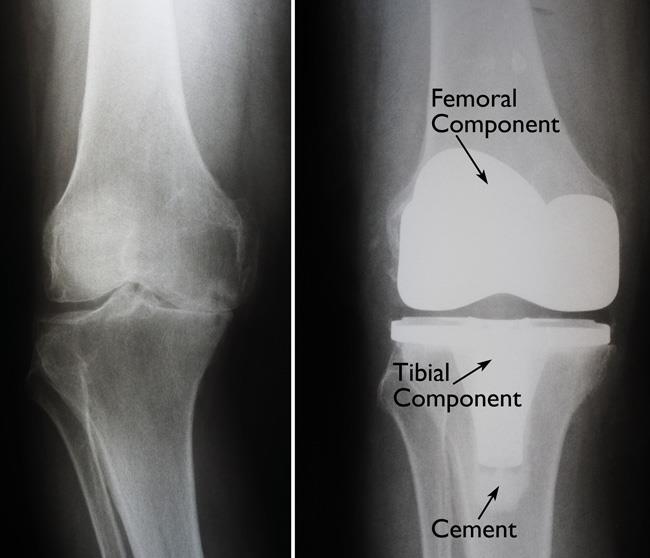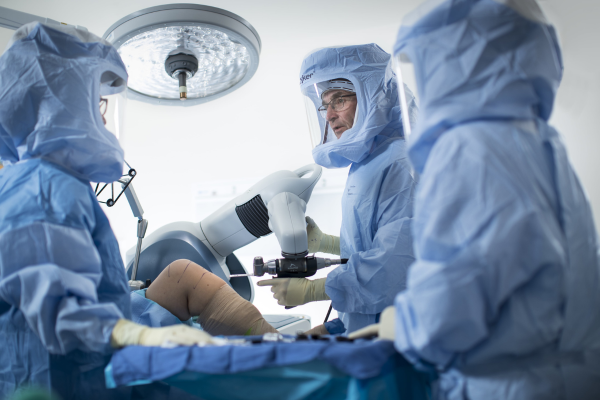
Robotic knee replacement surgery represents a cutting-edge advancement in the field of orthopedics, revolutionizing the way knee surgeries are performed. This innovative approach combines the precision of robotics with the expertise of skilled surgeons to enhance the overall success and outcomes of knee replacement procedures. Let’s delve into the five key benefits that make robotic knee replacement a transformative option for patients seeking relief from knee pain and improved mobility.
Precision and Accuracy:
Robotic knee replacement utilizes advanced imaging technology and robotic-assisted tools to create a personalized 3D model of the patient’s knee. This allows surgeons to plan the surgery with unparalleled precision, ensuring accurate placement of the implant. The robotic system assists the surgeon in executing the preoperative plan with a high degree of accuracy, leading to better alignment, stability, and overall implant positioning.

Customized Treatment Plans:
Each patient’s anatomy is unique, and robotic knee replacement enables a more personalized approach to surgery. The 3D modeling technology provides detailed insights into the patient’s joint structure, allowing surgeons to tailor the treatment plan to individual needs. This customization enhances the fit and function of the implant, potentially leading to improved long-term outcomes and patient satisfaction.
Minimally Invasive Approach:
Robotic-assisted knee replacement often allows for a minimally invasive approach, as the precision of the robotic system enables smaller incisions. Smaller incisions generally result in less tissue damage, reduced pain, and a faster recovery for patients. The minimally invasive nature of robotic knee replacement contributes to shorter hospital stays and quicker return to daily activities compared to traditional surgical approaches.
Real-time Feedback for Surgeons:
During the surgery, the robotic system provides real-time feedback to the surgeon, assisting in making instant adjustments as needed. This level of intraoperative information ensures that the surgical plan is being executed accurately and allows for modifications based on the specific conditions encountered. The combination of human expertise and robotic guidance enhances the surgeon’s capabilities and contributes to optimal outcomes.
Quicker Rehabilitation and Faster Recovery:
With the precision, customization, and minimally invasive aspects of robotic knee replacement, patients often experience quicker rehabilitation and a faster recovery process. The reduced trauma to surrounding tissues and more accurate implant placement contribute to improved joint function and early mobilization. Patients may regain their range of motion sooner, facilitating a speedier return to an active and pain-free lifestyle.
Conclusion:
Robotic knee replacement surgery stands at the forefront of technological innovation in orthopedics, offering a range of benefits that positively impact patient outcomes. From enhanced precision and customization to a minimally invasive approach and faster recovery, these advantages make robotic knee replacement a compelling option for individuals seeking effective and advanced solutions for knee-related issues. As technology continues to evolve, the future of orthopedic surgery holds the promise of further refinements and expanded applications for robotic-assisted procedures.
FAQ
What is robotic knee replacement surgery?
Robotic knee replacement surgery is an advanced orthopedic procedure that involves the use of robotic systems to assist surgeons in planning and executing the surgery with a high level of precision. It combines computer imaging, 3D modeling, and robotic tools to enhance the accuracy of implant placement and overall surgical outcomes.
How is robotic knee replacement different from traditional knee replacement surgery?
Unlike traditional knee replacement surgery, robotic knee replacement incorporates advanced technology, such as 3D imaging and robotic assistance. The robotic system provides real-time feedback to the surgeon, allowing for more precise planning and execution. This often results in smaller incisions, less tissue damage, and quicker recovery times compared to traditional approaches.
Is robotic knee replacement suitable for everyone?
Robotic knee replacement is generally suitable for many patients requiring knee surgery. However, individual suitability depends on factors such as the patient’s overall health, the severity of the knee condition, and the surgeon’s assessment. Consultation with a qualified orthopedic surgeon is crucial to determine if robotic knee replacement is the most appropriate option for a specific case.
What are the potential benefits of robotic knee replacement?
The key benefits of robotic knee replacement include increased precision and accuracy in implant placement, customized treatment plans based on individual anatomy, a minimally invasive approach leading to smaller incisions, real-time feedback for surgeons during the procedure, and quicker rehabilitation with faster recovery times.
Does robotic knee replacement result in a longer surgery time?
While the planning phase of robotic knee replacement may take some additional time, the actual surgery time is often comparable to traditional methods. The precision and efficiency of the robotic system can contribute to a streamlined surgical process, potentially offsetting any additional time spent on preoperative planning.
What is the recovery period after robotic knee replacement surgery?
The recovery period can vary depending on individual factors, but patients undergoing robotic knee replacement often experience a faster recovery compared to traditional methods. The minimally invasive approach and precise implant placement contribute to reduced pain, shorter hospital stays, and quicker return to daily activities.
Are there any risks associated with robotic knee replacement? As with any surgical procedure, there are inherent risks, and complications may occur. However, robotic knee replacement is generally considered safe when performed by skilled and experienced surgeons. Potential risks include infection, blood clots, and adverse reactions to anesthesia. Patients should discuss potential risks and benefits with their healthcare team before deciding on the surgical approach.
GET APPOINTMENT
Schedule Appointment : Your Path to Specialized Care
Get rid of your pain, stress, and enduring with our 24/7 dental services. It's a priority to relieve the pain in surgeon as much as possible. 90% of customers claim that they would come back & recommend us to others.
